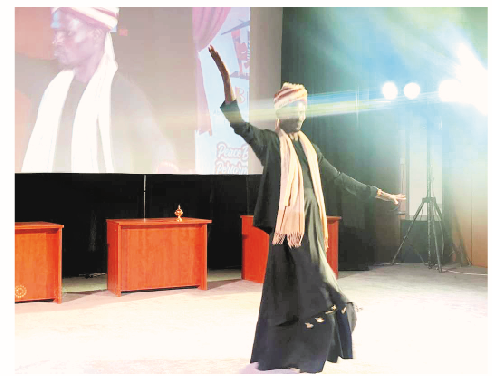At the maiden edition of the Abuja International Theatre Festival (ABITFA), Husayn Zaguru premiered the Afrodervish.
The whirling dervish is a dance by Sufi devotees, that is achieved by twirling to enable the dancer (costumed in long sweeping skirt and a shirt) enter a meditative trance in order to attain union with God.
However, Turkish Dervish dancers like Ziya Azazi, have turned that sacred dance into an artistic performance – putting up performances and dervish twirling workshops in several parts of the world.
Borrowing a leaf from Azazi, Zaguru took up the dervish twirling, infused with an Afro identity. “The dervish dance is culturally attached to the Turks, and I am no Turk. Afrodervish is not necessarily saying it has to be Afrocentric, rather as a sort of identity, of a black African man doing dervish dance.”
Zaguru’s performance takes the audience on a journey to different parts of world, Brazil, India, Nigeria, Latin America etc., intimated through the varied music, that are often time accompanied by spoken words and visual images.
Beyond the abrupt changeover of tracks which made the transition from one segment to another choppy, which is a result of his performance being cut short, the artiste’s twirling steps though lacked variation and intensity.
True to his word, Afrodervish is simply a nomenclature of an African doing the dervish dance, however, the act will become too simplistic if not improved upon with time. Audience will tire easily of its carefree and caricatured form (which differs from the intensity of swirls and emotions of a sacred dervish dance ritual).
One may argue that not everyone approaches dervish whirling as a sacred ritual, like the artist Azazi, whose practice deploys dervish twirling as a means of artistic self-expression and connection to one’s emotions and environment, but it can’t be seen as just turns and twists that everyone can do. So, while Zaguru has mastered to a point the art of non-dizzy twirls, he must elevate his craft with enhanced movements, artistic plot and intention. These will help him cement Afrodervish further as a style and brand.
Hence, the outgoing Ambassador of Brazil to Nigeria and author, Ronaldo De Lima’s collaborative offer to the artiste.
“What I most enjoyed about the performance is how much your wordless performance provoked words in me. You didn’t use words but I saw words, and I could fill the words as they went through my head. It was interesting. And if you are looking for a director, maybe we can work together in the future,” he said.





